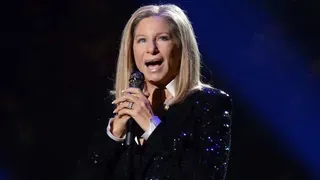December 16, 2010
A Marine Story puts a human face on DADT
Jim Halterman READ TIME: 9 MIN.
With the fate of Don't Ask Don't Tell being decided in Congress this month, no film is timelier than A Marine Story, the indie drama that puts a human face on the long-standing policy.
Since early this summer, the indie film (directed by Ned Farr) has found a following in film festivals throughout the country, winning best feature and audience favorite awards from Atlanta to Chicago to Los Angeles, where it won both the Grand Jury Award for US Narrative Feature and the Audience Award at Outfest.
When it premiered at the LGBT film fest Frameline, the San Francisco Chronicle wrote: "'Don't ask, don't tell' is all over Frameline this year, and 'Marine Story' is one of the winners, regardless of what happens with the official U.S. policy toward gays in the military... This film does not go where you might think it will go because it's so credibly written, acted and directed. 'Don't ask, don't tell'? How about 'don't miss this film.'"
The film focuses on Marine officer Alexandra (Dreya Weber) who returns home after being kicked out of the military. Once home she befriends and mentors Saffron (Paris Pickard), a young woman in need of the kind of direction and guidance that Alex brings from her military experience. The film unfolds with flashbacks to what exactly happened to Alex in the military but, without giving too much away, let's just say that the controversial Don't Ask Don't Tell military policy is the villain in this solid, well-told drama.
A third Outfest accolade - the Grand Jury Award for Actress in a Feature Film - was given Weber for her performance as the Marine officer with a secret to hide. The critics agreed: "Weber anchors the movie with a gritty, honest performance that has the same to-the-bone quality as Melissa Leo's in 'Frozen River,'" wrote Stephen Holden in the New York Times. "There's not a false note or inflection... the film is as trusty and upstanding as its protagonist."
EDGE's Jim Halterman talked to Weber recently to uncover the journey of this film to the big screen, the real-life research that, unfortunately, was not tough to find, her arm wrestling skills and how she was able to bring her skills as a top-notch choreographer for Cher and Pink to her role in A Marine's Story.
Ass backwards policy
EDGE: Can you tell me how the movie first came about?
Dreya Weber: After we made The Gymnast (which played at Outfest in 2006), the Here Network approached Ned and I about making another movie with them. We talked about ideas and I kind of threw out that I really wanted to do something action like I wanted to play an action movie. Ned was thinking a lot about the Don't Ask Don't Tell policy because it was around the time when information from the Middle East was coming out with data that they were letting go of these Arabic linguists because they were gay. There were only 90 linguists or something... it was so fucking ass backwards. We're eagerly fighting a war on terror but were more afraid of these service people than Osama Bin Laden? Come on! So Ned thought it was really fertile territory so he came up with this idea to have this super accomplished Marine be kicked out at a time when clearly we need all our soldiers.
EDGE: So obviously there was no problem in getting research on people getting kicked out, huh?
Dreya Weber: Oh, it's crazy. There's a really good amount of research. Zsa Zsa Gershick wrote a book called Secret Service that was a really great resource for [and] had a really interesting point of view but also we were able to have conversations and exchanges with currently serving Marines who are closeted through Facebook and MySpace. There's a shocking amount of stories out there and it was pretty incredible to research.
Story continues on following page:
Watch the trailer to A Marine Story:
Watch this interview with Dreya Weber about A Marine Story, recorded at Outfest:
Military highly sexual
EDGE: During one of Alex's flashbacks, she's told that if she admits to having sex with a man, it's a lesser of two evils. Did that come from your research?
Dreya Weber: Well, it's the truth. The military is a highly sexual. Everybody is having sex and that's what's so absurd about this policy. Most people serving, functioning military personal in our experience don't give a shit about your sexuality. All they care about is if they're going to be there for them, be a good Marine and follow the chain of command. But it is a highly sexualized environment. We were told by women that they would play up their sexuality and sleep with men even though they were gay literally to keep their job. It's such a strange life people are forced to live.
EDGE: I know the film is making a statement against the DADT policy but would you say it's pro- or anti-military?
Dreya Weber: I would say it's pro-military and anti-policy but here's the thing. I know people take exception to that but imagine if we had an anti-military and anti-policy movie, who's going to give that any credibility if it's just a diatribe? Nobody is going to take it seriously, in our opinion. In order to make a strong argument, it had to be supportive of the experience and clearly show an argument against the policy. It's still a movie and it's entertainment first off. You want people to watch it and be engrossed in the story and maybe it will help a little bit.
EDGE: Any surprises that you weren't expected to find either in the research or in making the film?
Dreya Weber: The biggest eye opener for me was I don't think there's a person that I read about or talked who - even after they'd been kicked out under this policy - didn't feel like the military was the best thing that had ever happened to them and would do it again in a heartbeat. That was astounding to me. I couldn't believe that somebody could have their career ruined, their whole life as a professional person destroyed and yet would do it again and completely supportive of this experience. It is amazing. Actually, that really helped me get into the character because I grew up in a super liberal family - peace rallies, anti-war everything - but what I really learned was that it's important we separate because the call to serve, we need that. Our society needs people who have that calling.
Not a diatribe
EDGE: After seeing your movie, it's clear that the issue is not as black and white as it might appear.
Dreya Weber: That's another reason why we felt like it was really important not to make it a diatribe and really try to show a person who is really honorable and in spite of what's happened to her she says she's going to help this kid and she's a little amped up about it but that's the kind of desire to be an honorable person that was really important for me to capture. I felt really responsible to make her credible.
EDGE: I think as more people that see this movie you're going to get challenged to a lot to arm-wrestle matches since you kick ass in the movie!
Dreya Weber: [laughs] I like arm wrestling although after the screening at Frameline this woman from the Air Force came down and she took off her jacket and she was like 'Come on! Let's go!' and she was strong! I was like 'Ya know, hey, let's take a picture instead.'
EDGE: Talk to me about the fight scenes, which must've been a challenge to film.
Dreya Weber: We had a great fight choreographer, Ned Mochel, whose work we'd seen in a play about a year before and it was the best fight I'd ever seen onstage. It was really realistic and messy. It put you on the edge of your seat. We said if we get to make this movie we're getting that guy. We worked with all the actors in our backyard and mapped it out and described it to him. We were pretty well-rehearsed once we got in there because we knew there were going to be chairs, benches and walls and bodies flying around. Me and the guys were so proud of ourselves because everyone wanted to do our own stunts - well, it's not like we had stunt doubles - and we kicked ass. Fight scenes are the most fun! They're so adrenaline-filled and they're dangerous and you really have to trust your other actors because you could get hurt so easy.
EDGE: Is that kind of choreography new to you or was it more similar than you'd expect from what you've done onstage for Cher and Pink?
Dreya Weber: I had done fight choreography for stage productions before but not on camera. It's really different in that the focus is really tiny. Our stunt choreographer said don't make silly fight faces and don't bite your lip, which was very good advice. Really, it was the confined space and how dangerous it was. Otherwise, the discipline of choreography is the same. The focus I need to do aerial -that really sharp focus - is the same kind of focus you'd want to have in a fight. There are all these little bench marks that you need to have instantaneously like you want to make sure you make eye contact with the person who's going to hit you or you're going to hit, you want to check around them really quickly so you're not going to get thrown into something. It's a really fast, millisecond kind of response.
EDGE: What's the plan for the movie at this point?
Dreya Weber: We're talking to certain people. We have a little more of a leg up because of The Gymnast. What we really hope with this movie - well, any filmmaker hopes their movie makes it as wide as possible - but particularly with this it would be nice because the policy needs to change and I hope when they deliver that report that they will just end it. It just needs to stop and if we can be a small part of the dialogue or if people are aware of it, that would be my hope but I don't know. It's a rough world out there for little movies that don't really have stars in them. We learned a lot in getting The Gymnast out into the world but it's tough!
For more on A Marine Story, go to .
Watch this interview with Ned Farr and Dreya Weber about A Marine Story:
Watch this feature from ABC News that features an interview with Ned Farr, director of A Marine Story:
Jim Halterman lives in Los Angeles and also covers the TV/Film/Theater scene for www.FutonCritic.com, AfterElton, Vulture, CBS Watch magazine and, of course, www.jimhalterman.com. He is also a regular Tweeter and has a group site on Facebook.







